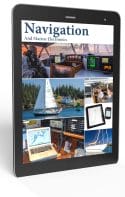Costal Passages, Part 4—Keep On Plugging
8 CommentsReading Time: 8 minutes
More Articles From Online Book: Navigation and Marine Electronics:
- Knowing Where It’s At
- Electronic Chart Dangers
- Keeping Safe From Chart Inaccuracies
- A Useful, But Potentially Deadly, Feature of Navigation Apps and Plotters
- Chart Plotters And Autopilots, Never The Twain Should Meet
- Do You Still Need Paper Charts?
- Backup Systems
- 11 Tips for Safe Navigation With Phones and Tablets
- 12 Electronic Navigation Tips From a Cruise on Someone Else’s Boat
- Marine Electronics System Recommendations
- 6 Tips To Stop Marine Electronics From Ruining Your Cruise
- Marine Electronics Recommendations—Communications
- Marine Electronics Recommendations—Radar
- Which is Best For Navigation: Plotter, Computer or Tablet?
- Coastal Passages, Part 1—Making a Plan, 10 Tips
- Coastal Passages, Part 2—Rounding Headlands
- Coastal Passages, Part 3—Off We Go
- Costal Passages, Part 4—Keep On Plugging
- Coastal Passages, Part 5—On To The Finish
- Passage Anchorages
- Navigating in Fog—The Tools
- Navigation in Fog—Preparation
- Navigation in Fog—Underway
- Radar Collision Avoidance, Part 1—Plotting
- Radar Collision Avoidance, Part 2—Turning Plotting Into Action
- 8 Radar Use Tips


Hi Colin,
Lovely article and an excellent example of the ingredients that a skipper needs keeping in mind to cook up a seemingly easy coastal passage.
My best, Dick
Hi Dick
sorry for the delay in replying, due to holidays!
Thanks for the kind words – I’m glad you are enjoying this series.
As I know you know, there’s no such thing as an easy passage – the times that I have done this particular passage in either direction and it has all gone as planned are non-existent. But by doing our homework and changing gear when necessary we can try and make it look easy! Best wishes, Colin
Thanks, Colin, for this useful series of articles. They resonate strongly as we approach the end of a relatively challenging cruise from home waters on the south shore of Nova Scotia, around the tide swept corner into the Bay of Fundy, through the Reversing Falls into the placid Saint John River, back through the Falls, through the swirling Letite Passage to Passamaquoddy Bay and home again. The imperatives of timing and need for careful planning were very real. We had excellent guidance and advice to ease our way (not to mention the pleasure of John’s company for few days) but it is a bit of a relief to be back in waters where tides, one of the triad of navigation challenges, can be mostly ignored and we only need to worry about the other two, wind and weather.
Wilson
Hi Wilson
it sounds like just the sort of challenging passage that I’ve portrayed here. Tricky but so satisfying when you get it right.
Planning is everything – without it there’s far too much that can go wrong. But there’s a lot of satisfaction in getting it right, too.
Best wishes
Colin
Thanks for your series Colin. As someone who is still learning about cruising this paints a great picture of future adventures.
Cheers
Hi Wes
this is what it’s all about to me. I hope you’ll find the same mix of trepidation and triumph that I’ve enjoyed in you own adventures – good luck!
Best wishes
Colin
This series, at least Part 3 and 4, are reminding me of our passage from Campbeltown, Scotland to Waterford, Ireland. We left noonish from Campeltown and got to Copeland Island around 2100ish where we anchored for a rest. Got up at 0200ish and went south to Akrlow on a long 22ish hour passage. Really enjoying seeing how someone else traveled the same coast, and it brings back some great memories, though we had F7 winds along with short steep waves,by the time we got to Carnsore Point. The pots where a chore to avoid that is for sure.
Can’t wait for the next installment. Will they stop in Campbeltown for some good Scotch? 🙂
Hi Daniel
That’s the way to deal with this coast in both directions – press on while the going’s good. Tough that you had F7 at Carnsore Point – not a great place to be in bad weather, as I know to my cost.
I’ve stopped many a time at Campbeltown, but not on this ‘created passage’. But the farther North you ago, the better the whisky gets….
Best wishes
Colin